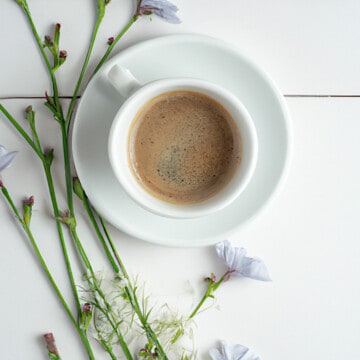A French novelist and playwright, Balzac's magnum opus was a series of plays and short stories called La Comedie Humaine about living in France in the years after Napoleon fell in 1815.
Not one who was short of things to say, Honore de Balzac left us with plenty of notable quotes, many about coffee.
For example, it was Honore who said:
For a while – for a week or two at most – you can obtain the right amount of stimulation with one, then two cups of coffee brewed from beans that have been crushed with gradually increasing force and infused with hot water.”
Honore de BalzacDe Balzac goes on to say that,
“For another week, by decreasing the amount of water used, by pulverizing the coffee even more finely, and by infusing the grounds with cold water, you can continue to obtain the same cerebral power.”
Honore de BalzacWell Honore de Balzac is not yet done with this scientific explanation of the effects of coffee being managed over time. He continues,
“When you have produced the finest grind with the least water possible, you double the dose by drinking two cups at a time; particularly vigorous constitutions can tolerate three cups. In this manner one can continue working for several more days.”
Honore de BalzacIt is not unlikely that when these words were penned by the esteemed writer his mind was indeed under the influence of copious amounts of meticulously prepared coffee.
With the effects ever less powerful, Honore continues his grand experiment, apparently on himself.
“Finally, I have discovered a horrible, rather brutal method that I recommend only to men of excessive vigor, men with thick black hair and skin covered with liver spots, men with big square hands and legs shaped like bowling pins.”
Honore de BalzacThis method that de Balzac speaks of is to drink coffee on an empty stomach to maximize its effects. He states,
“It is a question of using finely pulverized, dense coffee, cold and anhydrous, consumed on an empty stomach. This coffee falls into your stomach, a sack whose velvety interior is lined with tapestries of suckers and papillae.”
Honore de BalzacBalzac One of the Founders of Realism in European Literature
Balzac's ability to observe detail and represent the society of the time in France led to him being considered a founder of realism in European literature.
Apparently fashioning himself somewhat of doctor of the stomach, Honore explains,
“The coffee finds nothing else in the sack, and so it attacks these delicate and voluptuous linings; it acts like a food and demands digestive juices; it wrings and twists the stomach for these juices, appealing as a pythoness appeals to her god; it brutalizes these beautiful stomach linings as a wagon master abuses ponies; the plexus becomes inflamed; sparks shoot all the way up to the brain.”
Honore de BalzacAnd what is the effect of all of this activity. De Balzac continues,
“From that moment on, everything becomes agitated. Ideas quick-march into motion like battalions of a grand army to its legendary fighting ground, and the battle rages. Memories charge in, bright flags on high; the cavalry of metaphor deploys with a magnificent gallop.”
Honore de BalzacNot lacking any flare for metaphor de Balzac adds,
“the artillery of logic rushes up with clattering wagons and cartridges; on imagination's orders, sharpshooters sight and fire; forms and shapes and characters rear up; the paper is spread with ink – for the nightly labor begins and ends with torrents of this black water, as a battle opens and concludes with black powder.”
Honore de BalzacHonore de Balzac continues,
“The state coffee puts one in when it is drunk on an empty stomach under these magisterial conditions produces a kind of animation that looks like anger: one's voice rises, one's gestures suggest unhealthy impatience: one wants everything to proceed with the speed of ideas: one becomes brusque, ill-tempered about nothing.”
Honore de Balzac“Some friends, with whom I had gone out to the country, witnessed me arguing about everything, haranguing with monumental bad faith,” wrote Balzac. “The following day I recognized my wrongdoing and we searched the cause. My friends were wise men of the first rank, and we found the problem soon enough: coffee wanted its victim.”
Honore de BalzacThe writings of Balzac influenced many other famous authors including Charles Dickens, Gustave Flaubert, William Faulkner, Marcel Proust, Jack Kerouac, Emile Zola, Italo Calvino, and Fyodor Dostoyevsky as well as the renowned philosopher Friedrich Engels.
Your Coffee and Espresso Guide
Do you want to brew the perfect cup of gourmet coffee? Then see the Espresso Coffee Guides section on Gourmet Coffee Brewing.
For fabulous espresso coffee drinks see our Espresso Drink Recipes as well as the How to make a Latte. Don't forget that the most important part is Pulling A Perfect Espresso Shot.
For the espresso and coffee see World's Best History of Coffee, and for comprehensive terminology definitions see the Coffee Terms.
Buy Gourmet Coffee Beans
- ✔️ Fresh roasted to order
- ✔️ 100% high qualtiy Arabica coffee
- ✔️ Custom grind (or whole bean)
- ✔️ 1-way valve, laminate bag (for freshness)
- ✔️ Bulk discounts



nitpicker
A note: "Anhydrous" means "without water". Balzac was not recommending drinking coffee on an empty stomach (which would hurt)-- he was recommending eating pulverized coffee beans on an empty stomach (which would HUURRRRTTTT).